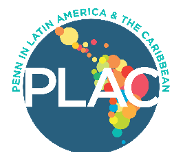Penn in Latin America and the Caribbean PLAC 6th Annual Conference
Basic Page Sidebar Menu Penn Global
Shared Narratives: Arts, Culture and Conflict in Latin America and the Caribbean
Friday, September 23, 2022
Perry World House | University of Pennsylvania
Varied artistic expressions in music, painting, literature, graffiti, cinema, and others, have the potential to promote reflection and critical thinking. They can also be powerful tools for cooperation, healing and resilience. How do the arts reflect our shared narratives, and the most pressing issues of our times? What roles do the arts play in times of peace and conflict, progress and crisis? The 6th PLAC conference will feature presentations from all disciplines, as they point to, or draw from, the intersections between the arts, social change, conflict and healing in Latin America and the Caribbean.
Conference Agenda
9:30 AM | Registration, Coffee, and Land Acknowledgement
Tulia Falleti, Class of 1965 Endowed Term Professor of Political Science & Director of the Center for Latin American and Latinx Studies
9:50 AM | Opening Remarks
Mércia Flannery, Chair of the PLAC 6th Conference Organizing Committee & Director of the Portuguese Language Program
10:00 AM | Welcome Remarks
Elizabeth "Liz" Magill, President of the University of Pennsylvania
Steven Fluharty, Dean and Thomas S. Gates, Jr. Professor of Psychology, Pharmacology, and Neuroscience, School of Arts and Sciences
10:20 AM | Opening Plenary: Penn in Latin America & the Caribbean
10:35 AM | Why Center the Arts in Latin American Studies?
Ashley Brock, Assistant Professor of Spanish and Portuguese
10:50 – 11:30 AM | Presentations : Social Change and Socio-Economic Impact in Latin America and the Caribbean
- Essentially Criminal: Examining America’s “Crimmigration” System Through Documentary Film
Maya Pratt-Freedman (‘23), Arts and Sciences - Culture-Shared Narratives of Healing and the Arts through Social Change in the Federation of Saint Kitts and Nevis
Cherése Godwin, Social Policy and Practice - The Disastrous Effects Of Leaders In Denial: Evidence From The Covid-19 Crisis In Brazil
Leandro S. Pongeluppe, Wharton
The Art of Social Change - Jonathan Katz, Art / Arts and Sciences
**Break**
11:40 AM - 12:10 PM | Presentations : Cultural Expression and Preservation in Educational Spaces
- Indigenizing the Classroom: Inclusive Teaching Through Storytelling
Teresa Giménez, Spanish and Portuguese / Arts and Sciences - Effective Communication for a Culturally Diverse Classroom: The Use of Gender Inclusive Language
Carlos Pio, Spanish and Portuguese / Arts and Sciences - The Library as a Place of Community: Bringing Together Researchers and Locals in the Yucatan
Hannah Rutledge, Penn Libraries - Cultural Stories and Cultural Heritage: Disrupting Maya Structural Inequality
Richard M Leventhal, Anthropology / Arts and Sciences - The Central American Political Poster Collection at Penn Libraries
Brie Gettleson, Penn Libraries
12:10 PM | Lunch
1:00 - 1:30 PM | Presentations : Artists, Repression, and Resilience
- Artistic Colombian Resilience During COVID-19
Juliana Bonilla, Nursing - Feminism in Latin American Film: Brazilian Women Directors
Simone Cavalcante, The Lauder Institute / Wharton
Unsovereign Elements: Geological Poetics in Contemporary Caribbean Art - (Art Exhibition: Spring 2023 at Kelly Writers House)
Cecilia Gonzalez-Godino, Spanish and Portuguese / Arts and Sciences - Employment Denial as Repression: Evidence from Argentina's Film Industry
Jane Esberg, Political Science / Arts and Sciences
1:30 - 2:00 PM | Presentations : Narratives of Resilience Across the Region
- Promesas Rotas / Broken Promises
Stephanie Rivera Fenniri, Design - Situating Bad Bunny in Post-María Puerto Rico
Selma Arroyo, Spanish and Portuguese / Arts and Sciences - Art of Social Change
Jonathan Katz, History of Art and Gender, Sexuality, and Women's Studies / Arts and Sciences - The Plantation is not a Specter. The Persistence of the Plantation Complex in the Latin American Novel (and reality)
Hugo Salas, Spanish and Portuguese / Arts and Sciences - La Villa Inmigrante
Obed Arango & David Villalvazo, Social Policy and Practice
**Break**
2:15 - 3:00 PM | Panel : New Perspectives on Afro-Latin American and Afro-Caribbean Agency, Resistance, and Power
Moderator: Odette Casamayor-Cisneros, Spanish and Portuguese & Africana Studies, Arts and Sciences
- Armas y Comida Pa’l Pueblo: Food as Resistance in the Dominican Nation
Bonnie Maldonado, Africana Studies / Arts and Sciences - Bomba Music and Resistance
Alexandra Sánchez Rolón, Africana Studies / Arts and Sciences - Why Compare? Narratives of Slavery and State Formation in the Americas
João Nery Fiocchi Rodrigues, Sociology / Arts and Sciences
**Break**
3:15- 3:45pm | Keynote : Playing Boring Games, Building Cross-Border Cooperation
Juan Llamas-Rodriguez, Assistant Professor of Communication, Annenberg School of Communication
3:45 PM | Closing Remarks
Mércia Flannery, Chair of the PLAC 6th Conference Organizing Committee & Director of the Portuguese Language Program
4:30 - 6:00 PM | Reception
Featuring performances by Penn's premier Latin dance troupe, La Onda, and musician Richard Miller and singer Vanessa Falabella
PLAC Conference 2022 Planning Committee
-
Cathy Bartch, Center for Latin American and Latinx Studies
-
Carlos Pio, Hispanic and Portuguese Studies Department
-
Cecília Gonzalez-Godino, Hispanic and Portuguese Studies Department
-
Chris Klaniecki, Penn Global
-
Jerri Bourjolly, School of Social Policy & Practice
-
Krista Cortes, La Casa Latina
-
Mércia Flannery, Hispanic and Portuguese Studies Department
-
Nancy Biller, School of Nursing

Each year, the PLAC Steering Committee, a cross-campus, interdisciplinary group made up of Penn faculty and administrators, partners with schools, centers, and departments across campus to organize an annual symposium that brings together the Penn community to highlight Penn work in Latin America and the Caribbean, and to promote interaction and collaboration among all who attend.

